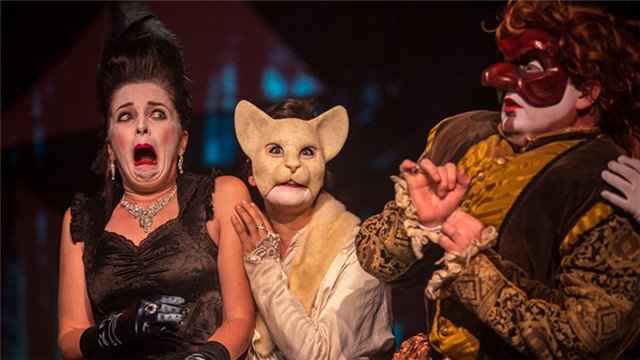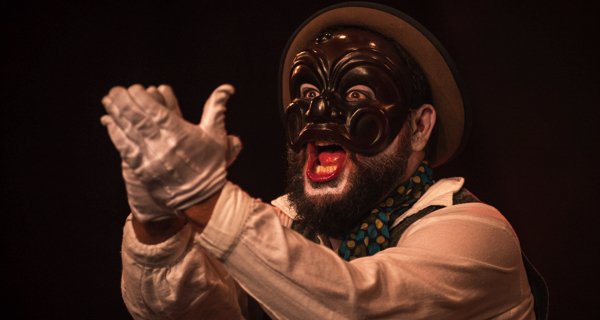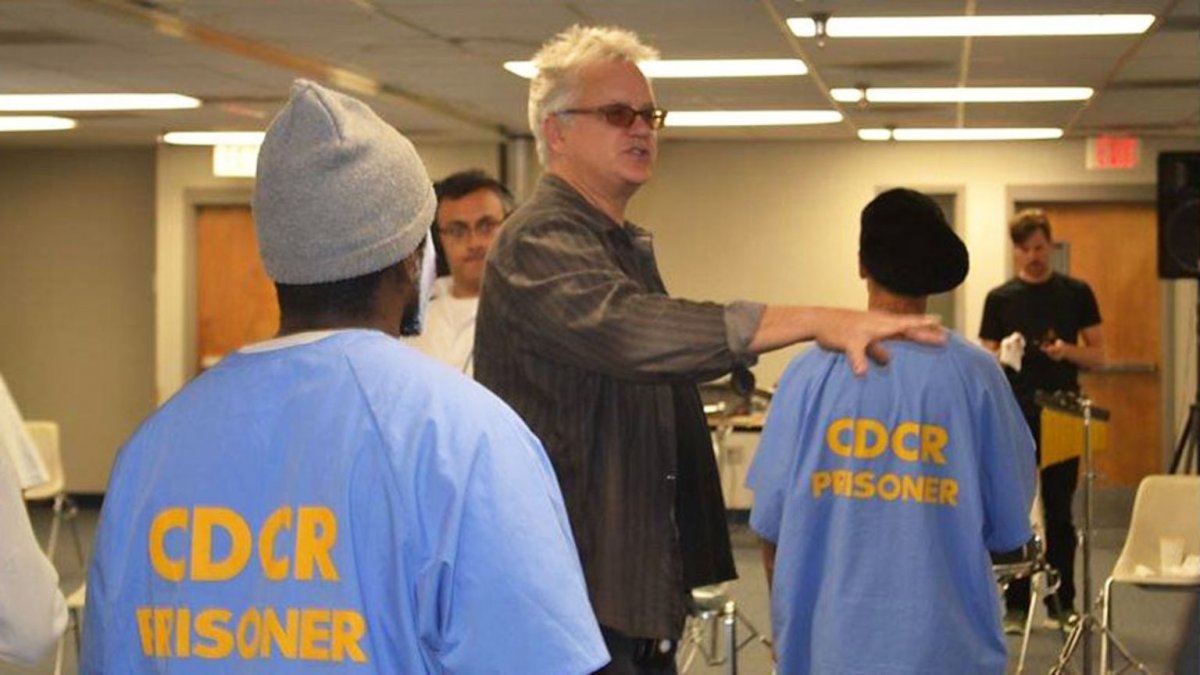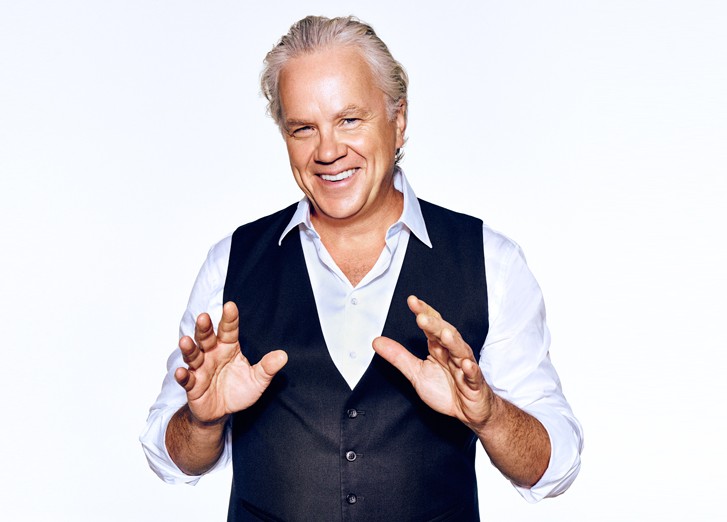Q&A With Oscar Winner Tim Robbins Ahead of His Troupe's NCPA Run, Nov 17-20
As the winner of an Academy Award, star of landmark films like The Shawshank Redemption and director of hits like Dead Man Walking, Tim Robbins’ face is one of the silver screen’s most recognizable. But now the 58-year-old actor, screenwriter, and director is teaching a team of younger performers how to cover their faces up.
Robbins’ latest stage project, Harlequino: On to Freedom, finds him directing his Actors’ Gang troupe in the sixteenth century Italian Commedia dell’Arte form which involves a great degree of improvisation and the donning of distinctive masks.
“You can’t just simply put a mask on and think you’re going to be a different character. There’s a whole metamorphoses that goes on, a whole training that’s involved, that the actor must go through before they find success with the mask,” Robbins’ said during a recent phone interview about the work that went into the production ahead of its November 17-20 run at the National Centre for the Performing Arts (NCPA). “So my actors have been working in this style for years and we were able to use the proper training and techniques to bring the masks alive.”
Below, Robbins tells us more about what drew him to this aged form, the dramatic task of convincing a master mask craftsman to give him masks for such productions, and how he and The Actors' Gang have used such theater techniques to help rehabilitate inmates not unlike the one he portrayed in The Shawshank Redemption.

Tell us about the cast that you’re directing in this production.
My actors aren’t only great artists but they’re also very generous people. Most of them are not only well trained in but also involved in our prison project. I’m interested in actors at The Actors' Gang that have more than just an interest in performing on stage, who are interested in more than just narcissism and being paid attention to. I’d rather work with an actor that understands our aesthetic and develop their talent, than work with a super talented selfish actor. So the way we pick people has more to with that than whether they’re good actors and dancers.
In 2014 the Actors' Gang performed at the National Centre for the Performing Arts as only the second American theatre company to do so. What was that experience like?
It was great, because first of all we were super excited about bringing Shakespeare’s A Midsummer Night's Dream to China. We weren’t sure whether it was going to work or not, we didn’t know how the language barrier would affect it. But after the first performance we were thrilled, because at the beginning of the play people were looking at the translations (displayed on screens next to the stage). But ultimately it was children that started to laugh, then we noticed the parents started to laugh with their children, and at the end I looked up and people were not looking at the translations, but just given over the visual elements and stakes of emotion that the actors had. That was really cool, it was a really exciting moment. Our audiences were absolutely wonderful in Beijing and Shanghai. And I hope a lot of young people come back and see us on this tour. It’ll make me of course very excited to come perform in Beijing again.
The work with the masks will probably break through any language barrier this time?
I believe so. Also it’s also the story. What I’ve written is a story that’s familiar all around the world. I’ve seen this story in every culture I’ve been in. It’s the basic story of the Commedia dell’Arte: the struggle between the master and the servant, and the necessity for true love to survive. So you have in every scenario the harlequin, the servant, finding a way to play a trick on his boss, the Pantalone. And in every scenario you also see the Pantalone trying to in some way marry off or sell his daughter to a rich man, while she’s in love with a younger less wealthy man. And in the course of each story, the servants find a way for true love to survive and create a situation where that can happen.
So it’s a very basic story, not hard to follow, and that’s why we believe it will play so well in other cultures. Also because it’s a universal story. So we’re very excited to perform it in Beijing and Shanghai.

But the visual element will of course be a huge part of it as well, correct? Especially the masks? Can you tell us more about how they were made and how they suit the play well?
They were made by a master mask maker in France who is recognised by the French government as one of the best mask makers in the country. And his work is incredible. I met him about 20 years ago through mutual friends at the Théâtre du Soleil. I asked a friend whether I could buy a mask from him. And he said he doesn’t sell masks, but if I wanted to come to the workshop he could show me some. So I had to kind of audition for him, to show him I knew how to work with masks and that I could teach others to work with them. And the way he looks at it, he makes masks for people that he believes can extend the life of that art form. He trusts me now, I have about 30 of his masks that we use in The Actors' Gang.
Was auditioning for him nerve wracking and intense?
No. Not at all. Because I knew what I was doing. And I had training in masks. I think he knew right away that I knew what I was talking about. He can tell right away. He can tell by the way you touch the masks, by the way you put the mask on. There’s all these little traps that people fall into. So I did not worry, no.
Aside from touring around the world, The Actors’ Gang has also done extensive workshops for inmates in California prisons. One prisoner said it made him feel human again.
Oh [pauses] … I would have to say it made me feel human again too. The great secret about volunteering is you get more out of it than the people you’re volunteering for. One of the things that this project has done is it’s gotten our company into a different level of commitment. We’ve always had education programs, and served our community in whatever way we could, we always kept ticket prices low so that the poor could come see our theater and see our plays. Ten years ago when we started the prison project, we did so because we noticed there was a real dysfunction happening in America, incarcerating way too many nonviolent criminals with draconian sentences and almost no rehabilitation programs.

As a company it made sense to enter into this realm of work. What we didn’t know was how effective the work we would do would be. For some reason our method of working – which is what we brought to the inmates, we do the same with them as we do with our own actors for our productions – for some reason this physical approach to acting, and a rigid demand for emotional honesty, became transformative for the men and women we were working with.
I always feel exhilarated when I leave the prison. I’m always in admiration of the courage that it takes for these men and women to take steps away from the status quo on the prison yard, and the courage it takes to open themselves up to emotions they may not have felt for awhile, that they kept away. Sadness and happiness and fear suppressed by some of them for 40 years. For them to then understand that they are still a human being with value, seeing them rediscover childish impulses that they’ve long since abandoned … Seeing 30-year-old badasses with teardrop tattoos running around playing a version of tag and giggling like six year olds … It helps you realize that every man or woman is worth more than their worst hour. A lot of these people are in prison because of stupid decisions, not to say they shouldn't be in prison, but we also are fully aware of the truth that even those that have done bad things, and are paying the price deserve dignity and respect. And at some point they will be exiting the prison, and it makes a lot more sense to get to the roots of the problem rather than have them return to freedom without having any rehabilitation.
What’s next for you and The Actors’ Gang?
We’re working on a play called The Refugee Project. I have at least 20 people in The Actors’ Gang, well all of us in the United States are from other places. So our new project is an exploration of what the migration of our different families were, and the question of “what is a refugee?” And our recent presidential election, with Mr Trump speaking in a xenophobic way about keeping people out of our country, is a reminder that we all in the United States, if you’re not Native American, is a refugee of some kind. And whether that migration happened in the seventeenth century or last year we have a common story in this country, and it should unite us not divide us. So we are creating a story about all of our families’ journeys to North America. We’ve done a few performances of it in an open workshop, so it’ll be something that we’ll probably open either in the spring or fall of next year.
Tim Robbins and the Actors’ Gang’s Harlequino: On to Freedom at The National Centre for the Performing Arts from November 17-20. Click here for more information.
More stories by this author here.
Email: kylemullin@truerun.com
Twitter: @MulKyle
WeChat: 13263495040
Photos: TV Insider, Festival Dispoleto, NCPA, BBC

